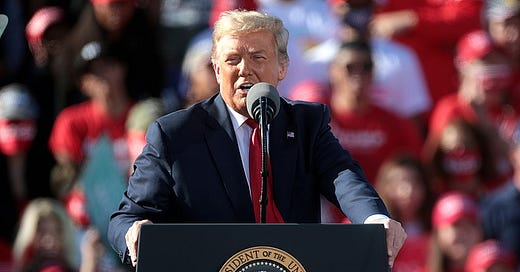Does Trump's Call for Mass Resistance Increase His Chances of Winning?
What to make of Trump's latest attempt at an uprising
In advance of a likely impending indictment in the Stormy Daniels case, Donald Trump has called upon his supporters to take to the streets to protest and “take our nation back.”
Let’s just try to think about what this means politically. Erick Erickson is hardly alone when he suggests that a Trump arrest would likely help Trump’s nomination bid:

The argument here is that the core belief of Trump and his supporters is that Trump is seen as a threat to the “deep state,” and that him being arrested provides validation that he and his supporters are being politically persecuted. This will bolster support among Republicans who had other concerns about Trump — he’s a drag in elections, he’s uncivil, he gets impeached a lot, etc. — and cause them to come back to supporting him, helping cement his nomination.
I think this is inaccurate. Trump supporters do not need this as an excuse to rally to him; they will find any reason to do that. There is a reservoir of motivated reasoning among Trump supporters the size of Lake Michigan. If the news against him is damning, they will claim that this just proves media bias against him. If he’s being prosecuted for breaking the law, this just proves the swamp hates him. If he’s caught speeding, this just proves that speedometers are rigged.
All this is to say that him being indicted will likely not harm him much in the presidential contest — his supporters will not turn against him — but nor will it help him. “Trump’s most enthusiastic supporters will support him enthusiastically if X happens” has been proven true time and again for eight years but doesn’t really tell us very much.
One thing captured in my recent survey of Republican county party chairs is that the views we associate with Trump — a conspiratorial view of government, sympathy for violent rioters, etc. — is really limited to the roughly 40% of the party that is already interested in or supportive of his candidacy. The rest of the party does not seem particularly open to these viewpoints, and indeed seems pretty closed off to them. (Also be sure to check out Natalie Jackson’s rundown of polling on January 6th.)
Trump’s call for mass resistance is not, in my opinion, particularly likely to help him in his bid for his party’s nomination. It is, however, likely to lead to political violence. As Lilliana Mason and Nathan Kalmoe’s book Radical American Partisanship convincingly demonstrates, leaders’ voices make an enormous difference in times of tension. Even a leader normally disposed to violence can decrease his supporters’ interest in perpetrating it with a few conciliatory words. Conversely, a leader who calls for people to take to the streets can make violence significantly more likely.
Similarly, violence in this situation could be less likely if other prominent Republicans choose to marginalize Trump, or at least not echo his conspiratorial claims. At least so far, however, we’ve seen the opposite. Speaker Kevin McCarthy called the investigation “an outrageous abuse of power by a radical DA” and threatened a congressional investigation against prosecutors. Former Vice President Mike Pence (who knows full well how dangerous Trump-organized protesters can be) attacked a “politically charged prosecution” and sympathized with protesters.
Trump’s gambit here seems designed less to improve his presidential fortunes and more to cow the American justice system, which, he is calculating, does not have the stomach to prosecute him in the face of riots. As Tom Nichols notes, Trump is trying to make it clear that he’s too dangerous to arrest.
But the behavior of Pence (and potentially other candidates) continues to be revealing. Obviously Pence cannot win over the portion of the party that favors Trump; they still see him as a traitor. He seems to be operating under the belief that he can’t win by attacking Trump, but maybe he could buy just enough good will among those sympathetic to Trump should the justice system remove Trump from the competition. As with previous moments of trepidation for Trump, prominent Republicans seem to be assuming that someone else will take care of the situation, and they’ll be there to consolidate things once he’s gone. This strategy has failed many, many times so far. But they don’t seem to have come up with anything else.





